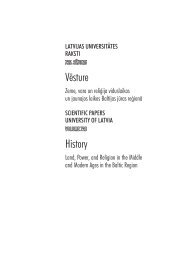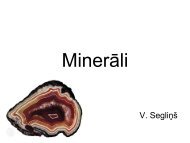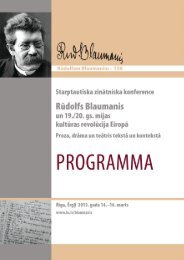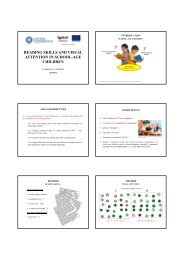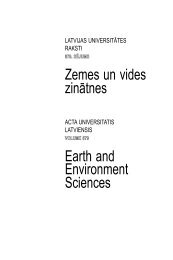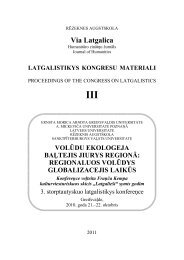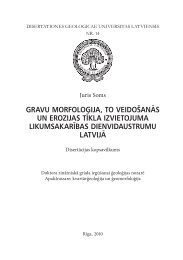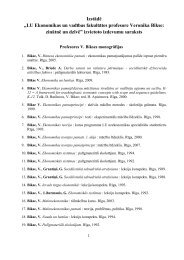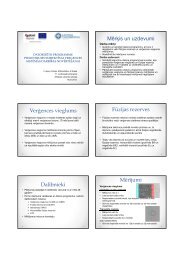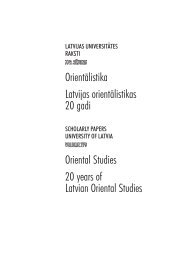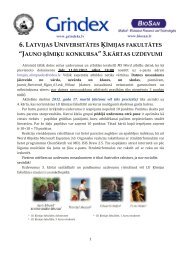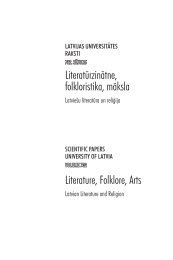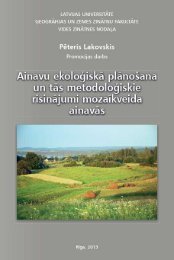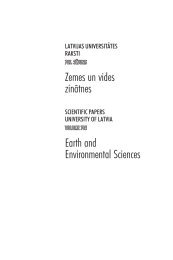Untitled
Untitled
Untitled
You also want an ePaper? Increase the reach of your titles
YUMPU automatically turns print PDFs into web optimized ePapers that Google loves.
12 LITERATÛRZINÂTNE, FOLKLORISTIKA, MÂKSLA<br />
blood. And perhaps not always they were so much god – fearing as it may seem to us<br />
today.<br />
In this author’s view, it is most interesting to look into the many “commandments”<br />
of human behaviour offered by different Sanscrit texts. On the whole they by<br />
far do not always particularly conform to what one understands by dharma, karma or<br />
moksha notions. It is obvious what was intended by the dying Bhîshma’s lecturing to<br />
Judhisthira: “They who fear no obligation of returning to this world (after death), they<br />
who have no fear of the next world, they who do not take animal food and who have<br />
no liking for what is agreeable and no dislike for what is otherwise, they to whom<br />
good conduct is always dear, they who practise self– restraint, they who consider pleasure<br />
and pain as same, they who have truth for their refuge, they who give but not<br />
take, they who have mercy, they who adore, Pitris, gods, and guests, they who are<br />
always ready to work (for the behoof of others), they who are universal benefectors,<br />
they who are endued with great courage (of mind), they who follow all the duties<br />
sanctioned by scriptures, they who are devoted to well– being of all, they who can<br />
give their all and sacrifice their very lives for others, are considered as good and virtuous,<br />
o Bharata.” 9 . Even stronger the supremacy of the spiritual over the mundane is<br />
stressed in some places of “Manu Laws”: “Refraining from oppressing any living<br />
being, so that they might become his companions in the other world, he should<br />
gradualy pile up his religeous merit just as ants pile up an ant hill. For there (in that<br />
world) father, mother, wife, son and relative do not endure as his companion; religion<br />
alone endures. A living creature is borne alone and alone he dies; he alone reaps the<br />
benefits of good deeds and the consequences of bad deeds.” 10 .<br />
In the teachings of the very influential Upanishads we find a well expressed negligence<br />
of a person’s body and worldly life. But in practical precepts to a student,<br />
who has finished his Veda learning, in the same Upanishads a teacher includes also<br />
fully worldly instructions, such as: “One should not be negligent of virtue. One should<br />
not be negligent of welfare. One should not be negligent of prosperity…Be one to<br />
whom a mother is a god. Be one to whom a father is a god. Be one to whom a teacher<br />
is a god. Be one to whom a guest is a god.” 11 . Who among the Non–hindus can object<br />
to such a set of advices? The authors of “Mahâbhârata”, omitting guest, about<br />
the adoration of mother, father, and preceptor say: “They are the three worlds. They<br />
are the three modes of life. They are the three Vedas. They are the sacred fires.” 12 .<br />
Râma proves in practise what the parents’ decision concerning their child means, by<br />
leaving the castle and without slightest objections facing the enormous difficulties of<br />
life in the forest. He tells Sîtâ: “But it is righteousness, my smooth– limbed wife, the<br />
righteousness good men in the past have practised, that I am set on following today,<br />
as its radiance follows the sun. And righteousness is this, my fair – hipped wife: submission<br />
to one’s mother and ones father. I could not bear to live were I to disobey<br />
their command.” 13 . Manu raises this adoration to the highest possible level: “The<br />
teacher is the physical form of the ultimate reality, the father the physical form of the<br />
Lord of Creatures, the mother the physical form of the earth, and one’s own brother<br />
the physical form of ones’s own self.” 14 . Whatever differences between those assertions,<br />
mother, father, teacher and brother are purely earthly notions for each person.<br />
The authors of the Upanishads state: “Now the man who does not desire– he who<br />
is without desire, who is freed from desire, whose desire is satisfied, whose desire is



